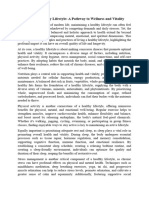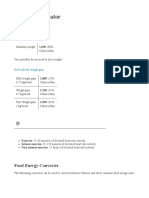Choosing To Be Healthy
Choosing To Be Healthy
Uploaded by
CassidyCopyright:
Available Formats
Choosing To Be Healthy
Choosing To Be Healthy
Uploaded by
CassidyOriginal Title
Copyright
Available Formats
Share this document
Did you find this document useful?
Is this content inappropriate?
Copyright:
Available Formats
Choosing To Be Healthy
Choosing To Be Healthy
Uploaded by
CassidyCopyright:
Available Formats
Choosing to Be Healthy: A Path to Wellness
Choosing to be healthy is one of the most empowering decisions an individual can make. Health
is not just the absence of illness but a dynamic state of physical, mental, and emotional well-
being. It involves conscious efforts in various aspects of life to create a balanced and fulfilling
existence. Whether it's through diet, exercise, mental health practices, or lifestyle choices, opting
for health means taking control of one's own life. This essay will explore the reasons for
choosing a healthy lifestyle, the benefits it offers, and the practical steps to make this choice
sustainable.
1. The Importance of Choosing Health
Health is the foundation of all activities, whether it's pursuing a career, enjoying personal
relationships, or achieving goals. A healthy body and mind provide the energy, focus, and
resilience needed to meet life's demands. Many chronic illnesses like heart disease, diabetes, and
certain cancers are preventable through lifestyle choices. The rise of these diseases globally
serves as a reminder that taking proactive steps towards health is essential.
Choosing to be healthy is also a preventive measure. Rather than waiting until illness strikes,
individuals can take control early on by integrating habits that reduce the risk of diseases. This
conscious choice fosters a sense of agency, ensuring people do not feel like passive recipients of
poor health due to genetics or circumstances but active participants in their own well-being.
2. Benefits of a Healthy Lifestyle
The benefits of a healthy lifestyle are manifold, ranging from physical health to emotional
balance and longevity.
Physical Benefits: A well-balanced diet, regular exercise, and sufficient sleep contribute
to maintaining a healthy body. These habits reduce the risk of conditions like obesity,
high blood pressure, and cardiovascular diseases. Physical fitness enhances strength,
endurance, flexibility, and overall energy levels, allowing individuals to perform daily
tasks with ease.
Mental and Emotional Well-being: Mental health is an integral part of choosing to be
healthy. Regular physical activity releases endorphins, often called "happy hormones,"
which help reduce stress, anxiety, and depression. Proper nutrition fuels the brain,
improving cognitive function, memory, and focus. Emotional well-being is also
supported by practices like mindfulness, meditation, and maintaining strong social
connections.
Longer Life and Better Quality: Studies consistently show that people who make
healthy lifestyle choices tend to live longer and enjoy a higher quality of life in their later
years. Avoiding harmful behaviors like smoking and excessive drinking, combined with
staying active and eating well, can significantly extend life expectancy while minimizing
the need for medical interventions.
3. Practical Steps to Choose Health
The path to a healthy lifestyle begins with simple, sustainable changes. Here are some practical
steps that anyone can adopt to start living healthier:
Balanced Diet: A healthy diet rich in fruits, vegetables, whole grains, lean proteins, and
healthy fats is essential for maintaining health. Avoiding processed foods, sugar-laden
drinks, and excessive sodium can prevent a host of health problems.
Regular Exercise: Physical activity is a cornerstone of health. Whether it’s walking,
jogging, yoga, or weightlifting, moving your body regularly strengthens muscles,
improves cardiovascular health, and boosts mental clarity. Aim for at least 150 minutes
of moderate exercise per week.
Mental Health Care: Mental wellness is just as important as physical health. Practicing
mindfulness, managing stress through techniques like meditation or journaling, and
seeking therapy when necessary are vital steps toward emotional stability.
Adequate Sleep: Sleep is often undervalued in the pursuit of health. Adults need 7-9
hours of quality sleep each night to repair their bodies and refresh their minds. Poor sleep
can lead to weight gain, depression, and impaired immune function.
Avoiding Harmful Substances: Steering clear of smoking, excessive alcohol
consumption, and recreational drugs is critical to maintaining good health. These
substances are major risk factors for several life-threatening diseases.
Social Support: Surrounding oneself with a supportive community or family is key to
maintaining motivation. Positive social connections foster emotional resilience and
provide encouragement when challenges arise.
4. Overcoming Barriers
Despite the clear benefits, many people struggle to consistently choose health due to various
barriers, including time constraints, lack of motivation, or social environments that don’t
prioritize wellness. Overcoming these barriers requires a proactive mindset. Setting small,
achievable goals, seeking social support, and creating a routine that incorporates healthy habits
can make it easier to maintain progress.
Education is also crucial. Understanding the long-term impact of unhealthy choices on one’s
body and mind can inspire change. Access to resources such as healthy foods, safe spaces for
exercise, and mental health care should be made a priority to enable more individuals to lead
healthier lives.
You might also like
- Barangay Nutrition Action Plan Template 2023 2025 A4 SizeDocument39 pagesBarangay Nutrition Action Plan Template 2023 2025 A4 Sizeniessel villaren100% (27)
- Workout SplitsDocument29 pagesWorkout SplitsHasaan KhanNo ratings yet
- SSTT X Jamal Browner 12 Week Vol 3 QMQJVDDocument213 pagesSSTT X Jamal Browner 12 Week Vol 3 QMQJVDPatrick JohansenNo ratings yet
- The Raw Westside Bundle Using The Conjugate Method For Raw Powerlifting - Jacob RothenbergDocument72 pagesThe Raw Westside Bundle Using The Conjugate Method For Raw Powerlifting - Jacob RothenbergJonatha B Santos100% (2)
- Healthy LivingDocument9 pagesHealthy LivingSaadNo ratings yet
- Importance of Healthy LivingDocument5 pagesImportance of Healthy LivingljmcalvinNo ratings yet
- Przykładowa Praca Nt. Zdrowego Stylu Życia (Ang)Document2 pagesPrzykładowa Praca Nt. Zdrowego Stylu Życia (Ang)pszjar22No ratings yet
- Holistic WellnessDocument3 pagesHolistic WellnessKrazy DroideNo ratings yet
- Untitled 1Document2 pagesUntitled 1pulaxpolaNo ratings yet
- Health: The Foundation of Well-BeingDocument2 pagesHealth: The Foundation of Well-Beinglefip60594No ratings yet
- Leos ProjectDocument5 pagesLeos Projectpindozz59No ratings yet
- 3Document2 pages3fatime2377No ratings yet
- HealthDocument1 pageHealthDanish UmerNo ratings yet
- Exploring The Determinants Interventions and Dimensions of Health 2023 7 24 5 52 41Document20 pagesExploring The Determinants Interventions and Dimensions of Health 2023 7 24 5 52 41Trailers of moviesNo ratings yet
- Being Healthy and Fit in Simple Terms Means Taking Good Care of The Body PDFDocument3 pagesBeing Healthy and Fit in Simple Terms Means Taking Good Care of The Body PDFolympianbestNo ratings yet
- Advice For Better HeathDocument2 pagesAdvice For Better HeathmajidkamalNo ratings yet
- To Be Healthy 5Document3 pagesTo Be Healthy 5Hoonchyi KohNo ratings yet
- Maintaining Good Health is Essential for a Fulfilling LifeDocument1 pageMaintaining Good Health is Essential for a Fulfilling Lifebipireh989No ratings yet
- Esquero, Maecy Anne Victoria D. Bs Architecture 2ADocument3 pagesEsquero, Maecy Anne Victoria D. Bs Architecture 2AluffyNo ratings yet
- How We Can Have A Healthy LifestyleDocument1 pageHow We Can Have A Healthy LifestyleLikaNo ratings yet
- 4 Dimensions of HealthDocument10 pages4 Dimensions of Healthmarla danaoNo ratings yet
- Health ImportanceDocument3 pagesHealth ImportanceMoataz abd el fattahNo ratings yet
- What Is HealthyDocument5 pagesWhat Is Healthykl21190153No ratings yet
- Document 27Document5 pagesDocument 27yousufNo ratings yet
- HealthDocument2 pagesHealthveruvanekNo ratings yet
- HEALTH - Exposition TextDocument13 pagesHEALTH - Exposition TextDrifer MarbunNo ratings yet
- Healthy Lifestyle Lesson ExampleDocument4 pagesHealthy Lifestyle Lesson Examplesac12No ratings yet
- Health and wellness speakingDocument4 pagesHealth and wellness speakingpicaboosalihNo ratings yet
- Health and Fitness Articles 2Document4 pagesHealth and Fitness Articles 2ᴅꜱʀ ɪꜱ ʙᴀᴄᴋNo ratings yet
- HealthDocument1 pageHealthphoo pwintNo ratings yet
- Living A Healthy LifestyleDocument2 pagesLiving A Healthy LifestylePatryk SadowskiNo ratings yet
- SPEAKINGDocument2 pagesSPEAKINGcunhanhphuc17052006No ratings yet
- Introduction To Health and FitnessDocument9 pagesIntroduction To Health and FitnessJellane SeletariaNo ratings yet
- Health_and_WellnessDocument3 pagesHealth_and_WellnessfzqcrmmivcohodnqzNo ratings yet
- Article on Health and FitnessDocument9 pagesArticle on Health and FitnessEverything ChannelNo ratings yet
- PE1 Module Week 1Document7 pagesPE1 Module Week 1마이No ratings yet
- CreativeDocument2 pagesCreativetbzsq856nzNo ratings yet
- Hábitos SaludablesDocument5 pagesHábitos SaludablesOliver Edgardo Corado GonzálezNo ratings yet
- Health and LifestyleDocument4 pagesHealth and LifestyleNischal AcharyaNo ratings yet
- Good Health A Holistic ApproachDocument8 pagesGood Health A Holistic Approachchr728748No ratings yet
- Hábitos Saludables InglesDocument3 pagesHábitos Saludables InglespelisprivadaNo ratings yet
- PE1 Module Week 1Document10 pagesPE1 Module Week 1마이No ratings yet
- In Order To Achieve Their Optimal Level of WellnessDocument3 pagesIn Order To Achieve Their Optimal Level of WellnessVINCENT MUHARINo ratings yet
- IntroductionDocument1 pageIntroductionAngeline SandovalNo ratings yet
- What Is Health and WellnessDocument1 pageWhat Is Health and WellnessJunrel LumiguidNo ratings yet
- Module-1 Good Health & It's Balance For Positive MindsetDocument12 pagesModule-1 Good Health & It's Balance For Positive Mindsetaman.kekkarNo ratings yet
- Personal Fitness and WellnessDocument22 pagesPersonal Fitness and WellnessPlacido Edgar MagaNo ratings yet
- HEalth M1Document6 pagesHEalth M1vijeth.inNo ratings yet
- Living A Healthy Lifestyle Is A Goal Many Aspire To AchieveDocument2 pagesLiving A Healthy Lifestyle Is A Goal Many Aspire To AchievemzingwaniorefileNo ratings yet
- English PresentationDocument18 pagesEnglish PresentationHnin SabaiNo ratings yet
- A Good HealthDocument4 pagesA Good Healthmahamrasool5522No ratings yet
- Lifestyle ChoicesDocument5 pagesLifestyle ChoicesarpankaurspammsNo ratings yet
- Vivir Sanamente Según ChatGPTDocument1 pageVivir Sanamente Según ChatGPTUlisesD. RamirezGonzalezNo ratings yet
- Sintaxe RRC 01Document24 pagesSintaxe RRC 01weebmyphone11No ratings yet
- HEALTHDocument2 pagesHEALTHletrankimanhn2k25hlkNo ratings yet
- Worksheet 3 NSTPDocument5 pagesWorksheet 3 NSTPcyrusjojieNo ratings yet
- Healthy LivesDocument17 pagesHealthy Liveslybuianhphu887No ratings yet
- 4 TDocument2 pages4 Tm-9171557No ratings yet
- PE - Eating ProblemsDocument5 pagesPE - Eating ProblemsJaimarae SumalnapNo ratings yet
- The Philippines' Foreign Policy Dilemma in The South China SeaDocument2 pagesThe Philippines' Foreign Policy Dilemma in The South China SeaCassidyNo ratings yet
- Essay On How To Achieve HealthDocument3 pagesEssay On How To Achieve HealthCassidyNo ratings yet
- Reaction Paper Sa Pelikulang Miracle in Cell No. 7Document2 pagesReaction Paper Sa Pelikulang Miracle in Cell No. 7CassidyNo ratings yet
- Avoiding WrinklesDocument3 pagesAvoiding WrinklesCassidyNo ratings yet
- Essay On Self-LoveDocument2 pagesEssay On Self-LoveCassidyNo ratings yet
- DearDocument2 pagesDearCassidyNo ratings yet
- Brigada Eskwela 2024 Accomplishment ReportDocument3 pagesBrigada Eskwela 2024 Accomplishment ReportCassidy100% (4)
- DLL 21st Century LitDocument2 pagesDLL 21st Century LitCassidyNo ratings yet
- A Moth Seeking Shelter in The Leaves of RiceDocument4 pagesA Moth Seeking Shelter in The Leaves of RiceCassidyNo ratings yet
- Practical Research DLL Week 2Document6 pagesPractical Research DLL Week 2CassidyNo ratings yet
- Training QuestionsDocument2 pagesTraining QuestionsCassidyNo ratings yet
- Concept-Of-Exercise Part 1Document25 pagesConcept-Of-Exercise Part 1Ayato ZenNo ratings yet
- Calorie CalculatorDocument11 pagesCalorie CalculatorMomo MamaNo ratings yet
- Canadian Standards For Psychiatric Mental Health NursingDocument28 pagesCanadian Standards For Psychiatric Mental Health NursingJoanneNo ratings yet
- Beep Test Protocol UploadedDocument3 pagesBeep Test Protocol UploadedEthan MilnerNo ratings yet
- Dr. Mike Israetel Training Volume Landmarks Hypertrophy RoutineDocument25 pagesDr. Mike Israetel Training Volume Landmarks Hypertrophy RoutineBen Chadney100% (1)
- PHUL Workout Guide: Day 1 PHUL Training: Power-UpperDocument5 pagesPHUL Workout Guide: Day 1 PHUL Training: Power-UpperTrần Quang Huy100% (1)
- Grade 11 P.E. Module 3Document13 pagesGrade 11 P.E. Module 3Jordan OfianaNo ratings yet
- 203 AsanasDocument35 pages203 AsanasTIME-TREVELER100% (1)
- LC098ALP000EVDocument36 pagesLC098ALP000EVrianrocheNo ratings yet
- Job Responsibilities PDFDocument34 pagesJob Responsibilities PDFRenita Chris100% (1)
- Physical Fitness 1 Jeopardy WebDocument27 pagesPhysical Fitness 1 Jeopardy WebAidan NicholsNo ratings yet
- G3 Mango (D) WP-WK3-2Document3 pagesG3 Mango (D) WP-WK3-2Mohamed Amr BakrNo ratings yet
- Tba PCV-12Document28 pagesTba PCV-12Thomas AbichNo ratings yet
- RP 6 Month Hypertrophy App-Fat LossDocument10 pagesRP 6 Month Hypertrophy App-Fat LossjonasNo ratings yet
- Supplements Cheat Sheet 2022Document16 pagesSupplements Cheat Sheet 2022Cynthia SalasNo ratings yet
- Health and Wellness AssignmentDocument17 pagesHealth and Wellness AssignmentAnjena KeshaNo ratings yet
- Acceleration Essentials 4 Week Training Program UPDATEDDocument19 pagesAcceleration Essentials 4 Week Training Program UPDATEDbenitoscardina41No ratings yet
- Google Forms Survey Sample H.S.B SBA 2023Document8 pagesGoogle Forms Survey Sample H.S.B SBA 2023Brianna ChuramanNo ratings yet
- Sergio Training RoutineDocument5 pagesSergio Training RoutineCALFNo ratings yet
- Training Swimming Sir LumanglasDocument16 pagesTraining Swimming Sir LumanglasJusthine Joy Magboo VisayaNo ratings yet
- Hand HygieneDocument1 pageHand Hygieneyopi kusumaNo ratings yet
- Assessment of Chronic Illness CareDocument11 pagesAssessment of Chronic Illness CareEman DesoukyNo ratings yet
- Module 1 Grade 11Document28 pagesModule 1 Grade 11Mae BeginoNo ratings yet
- PFA in Times of Conflict and UncertaintyDocument52 pagesPFA in Times of Conflict and UncertaintyfatimatahlehNo ratings yet
- Describe An Activity That You Usually Do With Your FriendsDocument1 pageDescribe An Activity That You Usually Do With Your FriendsKim Ngân PhạmNo ratings yet
- Analyse TanitaDocument10 pagesAnalyse TanitaChallenge fitnessNo ratings yet




































































































